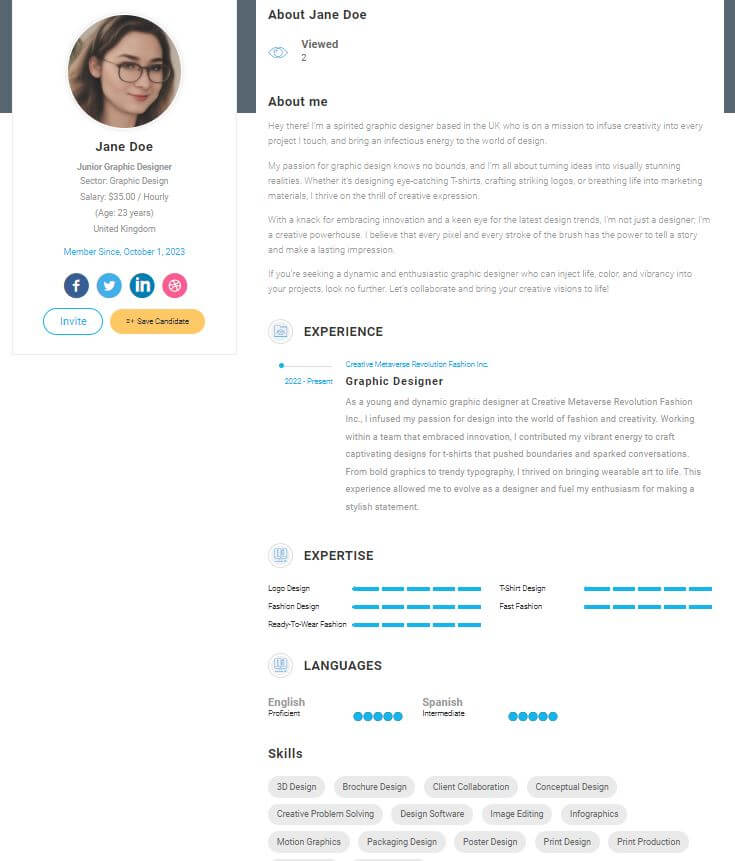Working as a remote developer offers a unique blend of flexibility, allowing you to craft a lifestyle that accommodates your personal and professional goals.
As a remote developer you get paid an average of $111K per year, this is way above the average hourly pay range of most remote jobs.
With remote technology, you can now collaborate with global teams, access cutting-edge tools, and keep your skills sharp—all from the comfort of your own home.
However, to become an effective remote developer, you don’t only need to have technical skills, you need to master effective remote communication, be self-driven and be good at time management.
As the demand for tech talent continues to outstrip supply, the job market for remote developers is burgeoning, offering ample opportunities for those with the right expertise and mindset.
Key Takeaways
- Remote work as a developer promotes a flexible and balanced lifestyle.
- Understanding your role and effective self-management are crucial for success.
- A systematic approach can help secure a remote developer position in the thriving tech job market.
Types of Remote Developer
As remote work grows to become more popular, several developer roles stand out. Each requires a unique set of skills and offers various opportunities for specialization.
Front-end Developer
As a Front-end Developer, you’ll craft the visual elements that users interact with on websites and apps. Your toolkit will include HTML, CSS, and JavaScript to ensure an engaging user experience.
Back-end Developer
If you prefer server-side development, the role of a Back-end Developer might suit you. You’ll focus on databases, server logic, and ensuring the backbone of the application is strong and functional, using languages like Python and Java.
Full-stack Developer
Full-stack Developers provide an all-encompassing solution; they’re well-versed in both front-end and back-end technologies. Your role will bridge the gap from the user interface to server-side processes.
Mobile App Developer
As a Mobile App Developer, you’ll create applications for devices like smartphones and tablets. Whether it’s for iOS or Android, proficiency in Swift, Objective-C, or Kotlin will be essential.
DevOps Engineer
DevOps Engineers are the backbone of the development lifecycle, automating processes to enhance efficiency. Your expertise in tools such as Docker and Jenkins will be pivotal.
| Role | Focus Area | Technologies & Tools |
|---|---|---|
| Front-end Developer | User Interface | HTML, CSS, JavaScript |
| Back-end Developer | Server Logic | Python, Java, Ruby |
| Full-stack Developer | Full Spectrum | Combination of front & back-end |
| Mobile App Developer | Mobile Platforms | Swift, Objective-C, Kotlin |
| DevOps Engineer | Automation | Docker, Jenkins, Kubernetes |
With these roles, your expertise will directly influence the success of projects and the satisfaction of users across the globe. Embrace your strengths and interests to choose your path in the expanding remote development industry.
Roles and Responsibilities of Remote Developer

As a remote developer, your primary role is to write and maintain code for your team’s projects. You’ll need to be proficient in various programming languages and development frameworks. This involves not only creating new features but also spotting and fixing bugs to improve overall software quality.
Code reviews are essential to your role. You’ll regularly participate in peer-to-peer code reviews, ensuring best practices are followed, and maintain a high standard of code quality. It’s vital that you contribute constructive feedback, helping your peers refine and perfect their work.
| Code Aspect | Your Role |
|---|---|
| New Features | Develop and integrate into existing systems |
| Bug Fixes | Identify, troubleshoot, and resolve issues |
| Optimization | Refactor code for efficiency and readability |
Effective communication is vital. You’ll need to articulate ideas and problems clearly whether you’re on a video call, chatting in a team messenger, or commenting within a project management app.
Timely updates on your progress and challenges you face keep the team aligned and projects on track.
Remember to support your colleagues. Team collaboration is key to remote work; this means being accessible, proactive, and resourceful within your team. Your ability to independently manage your tasks while being an active team player will contribute significantly to your success as a remote developer.
Future Job Market for Remote Developers
The landscape for remote developers is promising. As technology advances, the need for qualified software engineers, especially those capable of working remotely, is climbing.
Employment growth in tech-related roles is not just a trend but a robust projection into the future. Remote work opens doors to opportunities with tech giants and startups alike, stretching job prospects globally.
Key Drivers Influencing the Job Market:
- Technological Innovation: Breakthroughs in AI, blockchain, and cybersecurity are crafting new roles for software engineers.
- Adaptability: Your ability to learn and master emerging technologies will be crucial.
- Remote Work Acceptance: Companies are increasingly comfortable with distributed teams, broadening the job market.
Here’s how employment growth looks in comparison to tech advancements:
| Technology | Impact on Job Growth |
|---|---|
| Cloud Services | High demand for cloud experts and architects |
| Artificial Intelligence | Need for AI-fluent developers |
| Blockchain | Opportunities in secure transaction software development |
| Cybersecurity | Essential for protecting digital assets; integral in all development stages |
| AR & VR | Expanding niche for immersive experience creators |
As a remote developer, you will be in the vanguard, shaping the future of digital solutions.
Take advantage of this shift to remote work and gear up for an enriching career in software development, marked by job growth and employment opportunities across various sectors.
Your expertise will not only secure your career path but also provide you with a platform to innovate from anywhere in the world.
How to Become a Remote Developer (Step Guide)
Embarking on a career as a Remote Web Developer is an exciting venture with ample opportunities. This step guide will navigate through the essential stages to launch your career effectively.
1. Acquire Necessary Technical Skills
To kick-start your journey, focus on mastering HTML, CSS, and JavaScript. These core languages are the building blocks for both front and back-end development.
When you’re ready to progress, expand your knowledge to include frameworks and libraries such as React and JQuery, along with other programming languages like PHP and Ruby on Rails.
| Languages & Tools | Required for |
|---|---|
| HTML, CSS, JavaScript | Front End Development |
| PHP, Python, Ruby | Back End Development |
| React, JQuery, SQL | Full Stack Development |
2. Develop Soft Skills
Your communication skills must be top-notch to collaborate effectively with teams and clients across various locations.
Time management and self-motivation are also critical, as remote work requires a high degree of discipline and the ability to maintain a healthy work-life balance.
3. Build a Professional Portfolio
Create and maintain a portfolio on platforms like GitHub to showcase your projects and demonstrate your coding prowess. Add variety to your portfolio by including both solo and collaborative projects.
Ensure your LinkedIn profile is up to date and reflects your latest work and skills.
4. Gain Experience and Feedback
Start with freelance work or internships to gain practical experience. Seeking mentorship and feedback is vital for improvement.
Engage in projects that provide validation of your skills. Gradually build towards showcasing your capability for remote experience.
By adhering to this step guide and committing to continual learning and self-improvement, you will be well-equipped to navigate a successful career as a Remote Web Developer.
How to Look for Remote Developer Jobs?

Targeting your search can streamline the process of landing your ideal remote developer job. Here’s how you can customize your approach to fit the remote job landscape.
1. Customize Your Résumé and Cover Letter
Your résumé and cover letter are your first impressions. Tailor them to reflect the tech stack and culture of the companies you’re eyeing.
Highlight your experience with remote work, emphasize communication skills, and show how you’re a low-risk, high-value candidate.
2. Utilize Specialized Remote Job Platforms
Navigate the remote job terrain via platforms dedicated to remote tech employment. Sites like HQHIRE.com, Turing.com, Upwork, and others cater specifically to remote developers.
They can offer more focused opportunities than broader job sites.
| General Job Sites | Specialized Job Platforms |
|---|---|
| Higher competition | Lower competition |
| Broader job listings | Tech-specific job listings |
| Less remote work focus | High remote job availability |
3. Leverage Professional Networks
Networking is key. Use platforms like LinkedIn for making professional connections.
Attend virtual meetups or engage in tech communities on GitHub, Slack and Twitter to increase your visibility and let others know you’re on the market for a remote developer role.
Get your 100% Free online resume and get noticed by potential employers. Start out of the crowded space of millions of remote job seekers and find the remote job that you will enjoy and love.

Frequently Asked Questions

Navigating the transition to a remote web development career brings up many questions. Below are targeted answers to assist you on your journey.
What are the initial steps to transitioning into a remote web development career?
Begin by assessing your current skill set and compare it to job listings for remote web developers. Then, update your LinkedIn profile and resume to reflect relevant skills and experience.
What skills are required to secure a remote job as a web developer?
You must be proficient in programming languages such as HTML, CSS, JavaScript, and frameworks like React or Angular. Familiarity with version control systems like Git is also crucial.
How can I enhance my web development skills for remote work opportunities?
Invest in online courses or bootcamps to learn new technologies. You should also contribute to open-source projects and participate in coding communities to gain practical experience.
What is the average salary for a remote web developer, and how can I negotiate it?
Research indicates the average salary varies widely based on location, experience, and the company. Use sites like Glassdoor to understand market rates and be ready to discuss your value during interviews.
What strategies should I employ to find and land remote developer positions?
Build a strong online presence through a professional portfolio and active engagement on platforms like GitHub. Also, network through online tech communities and utilize job boards dedicated to remote roles.
As a full stack developer, what essentials should I know to work remotely?
You should be proficient in both front-end and back-end development. You should also understand basic design principles and be comfortable with databases and cloud services.
Effective communication and time management skills are key to remote work success.
- 5 Minutes Online Meeting Games to Foster Teamwork and Engagement Remotely
- 11 Benefits for Getting a Remote Job: Unlocking Flexibility and Freedom
- How to Get Remote Writing Jobs For Beginner (Freelance Writing)
- How to Get a Remote Part-Time Job (Flexibility + Stability)
- How to Get a Second Remote Jobs and Earn a 6-Figure Salary?
Join over 11,000+ achievers who are committed to achieving their career goals!







![How to Hold an Effective Team Catch up Meeting [+Examples] 11 How to Hold an Effective Team Catch Up Meeting](https://hqhire.com/wp-content/uploads/2024/04/Face-to-Face-Meeting-7-min.jpg)
